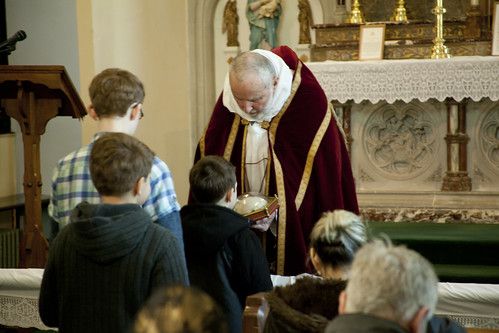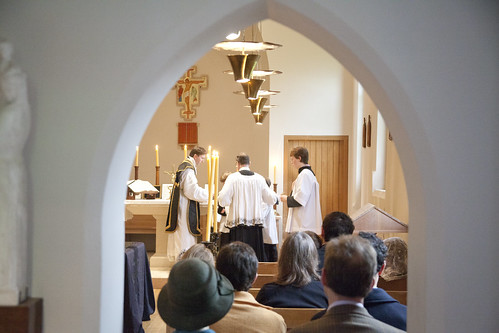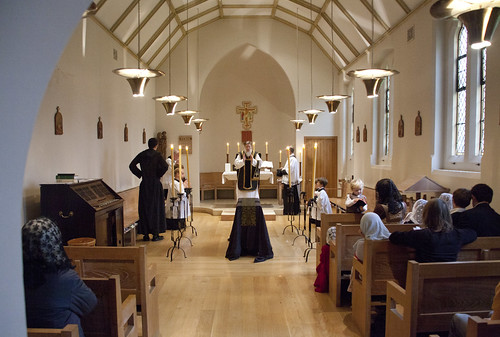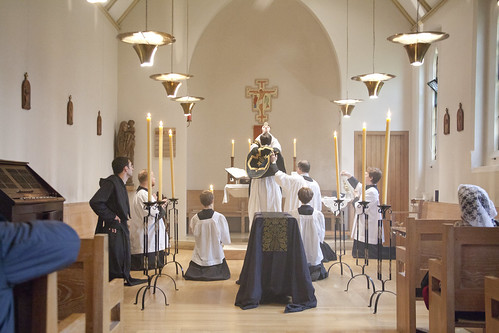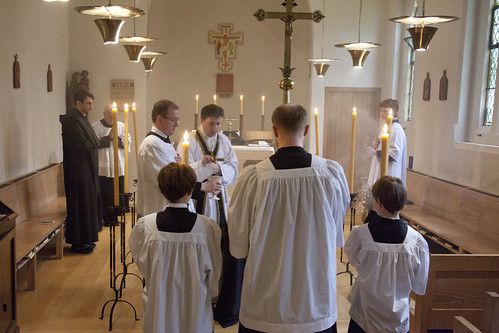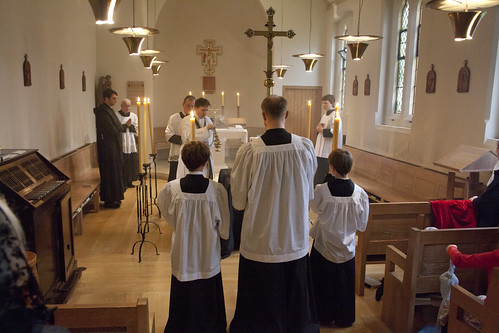Chairman's Blog
LMS Pilgrimage to Wrexham
 There was a Missa Cantata at Wrexham Cathedral in Wales on Saturday for the LMS annual Pilgrimage to Wrexham in honour of St Richard Gwyn, a co-patron saint of the LMS.
There was a Missa Cantata at Wrexham Cathedral in Wales on Saturday for the LMS annual Pilgrimage to Wrexham in honour of St Richard Gwyn, a co-patron saint of the LMS.
The diocese of Wrexham is currently suffering considerable upheaval and church closures at the moment. It's great to see the Traditional latin Mass flourishing there.
Canon Scott Tanner was the celebrant and he brought with him a team of servers and singers from the Dome of Home.
The new LMS website is here!
Support the work of the LMS by becoming an 'Anniversary Supporter'.
Now there's an app to learn the server's responses at Mass!
 Highly recommended! Well done to Bill Redic and Una Voce Pittsburg for making this available.
Highly recommended! Well done to Bill Redic and Una Voce Pittsburg for making this available.This is a very specialized application - a training aid for servers of the Traditional Latin Mass. It provides a three-step aid to memorization of the Latin prayers and responses which a new server must master.
On the Memorize tab, all of the Latin prayers and responses, along with a phonetic pronunciation guide, are displayed. The new server must devote hours to the hard work of committing these prayers to memory.
On the Practice tab, the server hears a recording of a Priest and Server reciting the Latin prayers and responses. By reciting along with the Server, while following along with the written prayers, he becomes more familiar with them. Ten buttons allow easy repetition of particular prayers on the recording.
Finally, on the Test tab, the server tests his proficiency. The audio contains only the Priest's voice, and the new server must make all of the responses. By using the Pause button, he can get help with any prayer on which he is stumbling.
Children and the New Mass
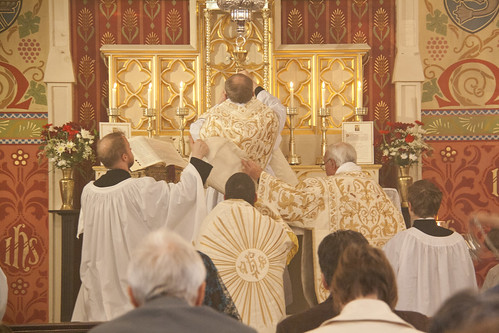 |
| Dull would he be of soul who could pass by / A sight so touching in its majesty. (Wordsworth) |
Continuing my theme of the last post, I can summarise what I have been saying in this way. Having an experience which one doesn't fully comprehend will lead to greater understanding, if it or similar experiences are repeated regularly, especially if, further, there are opportunities for asking questions from time to time, and other kinds of help. The liturgy is like this for children, but it is also like the experience of the emotional life of the family, since it evokes emotional and spiritual responses. Just as within family life, as children grow up they become more sensitive to emotional cues and more comprehending of others' needs, they also gain acuteness, from repeated experience, in the emotional and spiritual significance of the liturgy. There is a also a parallel in the special sensitivity very small children have to atmosphere.
The Novus Ordo Missae, and the attitudes which led to it, has created a problem in relation to children, because the leading idea of the reform was that worshippers should be able to understand the liturgy at a verbal level. That is the point of putting it into the vernacular, or having shorter and theologically simpler prayers, of getting the people to make more responses, and so on. Why is this a problem for children, you ask? Doesn't all this make it easier for children to understand? At a verbal level, the OF is indeed easier for children to understand. The problem is that if your conception of participation is verbal comprehension, then you have set yourself an impossible task in getting children, particularly small children, to participate. It doesn't matter how simple the language is. Some of the children at Mass can't even talk.
To repeat, the Ordinary Form is vastly, incomparably, better suited to immediate verbal comprehension than the Extraordinary Form. Not only does the latter use a non-cradle language, Latin, but even a worshipper who was a Latin prodigy would not be able to grasp the Canon or the Offertory at a verbal level as it goes along (without looking at a book) because they are said silently. This fact makes it obvious that immediate verbal comprehension is not the aim of the EF. Instead, it uses a range of verbal and non-verbal means to communicate something deeper than mere words, and does so with great effectiveness, just as the liturgy of the Eastern Churches does. The problem created by the OF is that, having set immediate verbal communication at the objective, and having removed the great bulk of the things which facilitate non-verbal communication in the EF, it is then faced with a category of worshippers with extremely limited, or indeed non-existent, verbal skills. Small children are never going to participate in the Mass in the way that the creators of the Novus Ordo wanted people to participate: with immediate verbal comprehension.
The response of the promoters of the liturgical reform was twofold. First, they tried to make the language even easier: having set out to create a Eucharistic Prayer which is 'short and very simple in its ideas', viz. EP2, they realised this was still far too difficult for children, so they created special Eucharistic Prayers for them. Other adaptations to the liturgy when offered for children are also recommended in the Directory for Children. The result of course can be a liturgy quite unbearable for adults, but in any case small children will, still, hardly understand a word of what is going on.
The Directory for Children is very concerned about children bing bored. So the second prong the response is to take children out of the liturgy altogether, at least for a large chunk of the Mass, and to give them some kind of para-liturgical experience instead. Many of these are hideous in every way; no doubt others are well-constructed and reverent. But they don't and can't solve the problem, because although there is even more flexibility about the language used, verbal comprehension is always going to be difficult or indeed impossible with children with little or no verbal capacities. At the same time, the informality of these para-liturgies moves us even further away from the techniques of non-verbal communication which work so well in the EF.
In other words, the means adopted to make the liturgy easier to understand by children are digging us deeper and deeper into the hole. Adopting simpler and simpler language in a more and more informal structure, makes it harder and harder for the children--or for anyone--to pick up non-verbally the sacred realities taking place in the liturgy. But with children, particularly small children, such non-verbal cues are the only way of engaging them, because they have limited or actually no ability to use words.
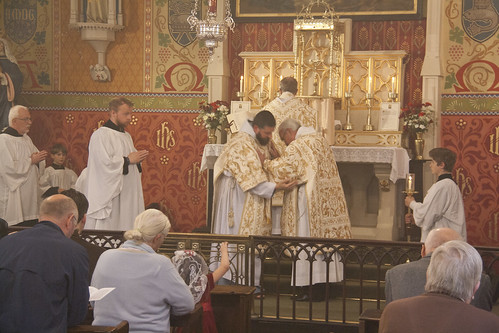 |
| You have to be highly educated to think that this is not an eloquent symbol. |
It doesn't matter what you say to a two-year old, and it makes little difference what you say to a five-year-old, or even an eight-year-old or to many fourteen-year-olds: they are not going to grasp any kind of extended liturgical text verbally, particularly if they have not heard it lots of times before. As a matter of fact, I don't think that I myself would be able to grasp an unfamiliar Eucharistic Prayer, in real time as it was declaimed from the Altar: that is actually quite a demanding task. What children can, in time, come to appreciate, is the grandeur of a procession, the beauty of chant, and the special significance of the Elevation--if, of course, these are allowed to be grand, beautiful, and special.
Let me make the same point from another perspective. In the EF, there is great formality in what is going on in the sanctuary, and considerable informality about what is going on in the nave. There are no binding rules for the laity to stand and sit and kneel. There are few responses, and there is no pressure to make them. People are free to say their own prayers.
In the Novus Ordo, the situation is reversed. The solemn formality of the sanctuary has been considerably downplayed, and many priests do their best to make things look spontaneous even when they are not. In the nave, it is another matter. The laity can even be barked at to stand, sit, kneel, make responses, hold hands, sing songs, and so on. Their outward liturgical participation is controlled: spontaneity is forbidden.
What of children in the two settings? In the first, they can move around with less chance of disturbing others, because there is no elaborately choreographed activity going on among the congregation. On the other hand, the stuff going on the sanctuary is deeply interesting from a visual point of view, and will become embedded in their imaginations precisely because it is predictable and repeated. Furthermore, it creates a powerful atmosphere of quiet and awe, which children are well adapted to absorb.
In the second, there is pressure to take part, if not in the main congregation's activities, then in special activities for the kiddies in the Children's Liturgy. Children are systematically prevented from thinking their own thoughts, or absorbing what is going on at their own pace, in their own way. Then again, there is much less to see, and what there is does not fall into such well-defined patterns; it is less dramatic, less vivid, and isn't repeated week by week in the same way. The sense of the sacred, the 'sacrality', everyone seems to agree, is less pronounced.
Which is better suited to the participation of children? I think the answer is obvious.
To summarise the matter, the kind of participation proposed to the laity in the Ordinary Form is less suited to children.
This is a particular application of a more general point, which I have made before on this blog. It is commonly observed that the less educated, and men, are less readily engaged with words, and this is part of why, as Anthony Archer argued, the Catholic Church lost its English working-class backbone after 1970; it is also part of why Novus Ordo congregations are skewed towards women, and EF congregations are more balanced between the sexes. The problem arises even more acutely with groups of Catholics for whom the vernacular used in the liturgy is not their mother tongue.
The Novus Ordo was composed by, and for, highly articulate, intellectual, educated, middle class individuals, who managed to persuade themselves that what they were doing was going to be quite marvellous for the simple folk, the missions (where vernacular Masses are frequently not in the language of the people present), and for children, because it was all going to to be simple.
Simple things for simple people. Well these 'simple people' may even have been better equipped than the patronising middle class educational elite to pick up the symbolic and atmospheric cues of the ancient liturgy: the anthropologist Mary Douglas argues this in all seriousness. What they are not so good at is this precisely this verbal stuff.
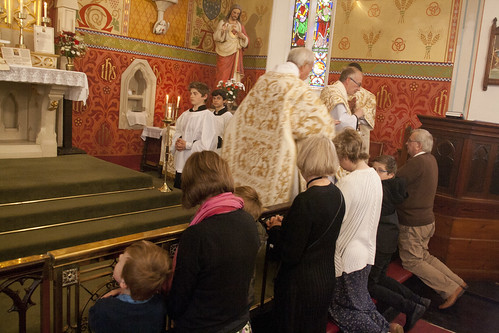 |
| Photos: High Mass in Holy Trinity, Hethe. |
Support the work of the LMS by becoming an 'Anniversary Supporter'.
Children at Mass
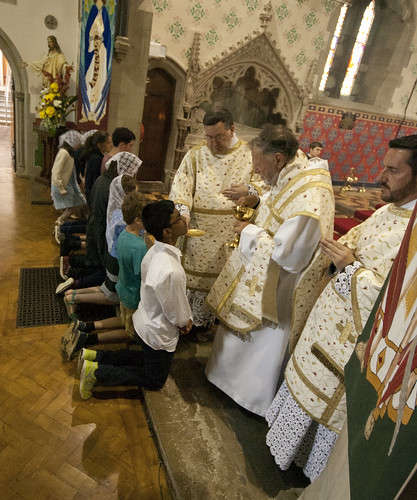 |
| At the St Catherine's Trust Summer School |
Seeing this post on the internet, by a Protestant about children's liturgies, which makes some good points, has stimulated me to attempt to put my thoughts into order about children at Mass. However this process is still at an early stage...
I have written on this blog about how the 1974 Directory on Children explicitly promoted the idea that children should be introduced to the liturgy through 'human values', and expected them to 'open their eyes' to the supernatural nature of the liturgy only at a later stage. I think this idea is the source of a large proportion of the confusion and mistakes which are found in the debate today. It seemed to me to parallel Maria Montissori's argument that young children are not ready for fairy stories, because they cannot distinguish fantasy and reality. It is also related to the idea we find in the Liturgical Movement, that 'understanding' is necessary to participation in the liturgy. If 'understanding' is a matter of being able to articulate the message being conveyed, then this is a argument for a drastic simplification of the liturgy, a simplification which must go even further when the liturgy is being offered to the 'simple', and to children. This is exactly the pattern we see in progressive liturgical talk, so I think this must be what they are thinking, or something like it. The poor and uneducated cannot understand complicated theology, give them something simple, they say.
Now this of course is a terrible mistake. To see it is a mistake, just think of wordless prayer: the kind of prayer used by the Church's saints and mystics, to which we are all encouraged to aspire. (The Catechism of the Catholic Church has a magnificent section on prayer which says a lot about this.) A person who engages in wordless prayer, is he able to articulate, to put into words, the propositional meaning for his experience? Of course not. Does that mean that he failed to participate in this practice, or failed to communicate? Far from it.
The same point can be made in relation to the appreciation of art. Do you need to be able to articulate, put into words, what you gained from an encounter with a great work of art, for it to count as a meaningful experience? Don't be daft.
A different brand of progressive in the Christian world is very against propositional, intellectual, linear, logical, theology. Quakers, for example, don't do a great deal of logic-chopping in their theological reflections, and have wordless, silent worship to go with it. The Catholic tradition combines mysticism with intellectual rigour - quite an achievement, when you think about it. It is the liberal achievement to destroy both at the same time, which is equally impressive, though in a different way...
Anyway, once we free ourselves of the unfortunate idea that people don't get anything out of an experience when they can't write down it's meaning in a series of propositions, then we can think about a whole lot of things in a more sensible way. The relationship a parent can have, for example, with a Down's Syndrome child. The wordless companionship of those in love. The social experience of interactive sports. The world really is an interesting place, if you don't limit communication to words, and meaningful experiences to things which can without remainder be put into words: we all know this, if we don't let liturgical maniacs befuddle us.
Accordingly, there is no reason to assume that small children don't get something out of the liturgy, and it is misleading to say that they do not understand it. Understanding a complex experience is a matter of degree, and small children understand things at their own level, in their own way, and gradually come to understand more, if they keep on having similar experiences. That's how they learn. It no more makes sense to say 'they shouldn't be at Mass (or: the normal Mass) because they don't understand', than it makes sense to say that they shouldn't be exposed to adults talking to each other, or paintings, or school work, or loving relationships. How are they ever going to understand it, if they are not exposed to it?
To take this to a deeper level, I want to note three categories of experience children have.
The first is in relation to things that particularly appeal to them. Children can pay very close attention to stories, and on occasion remember them in great detail. They can be fascinated by farm or wild animals. And of course they can be completely absorbed in play. These examples show children's considerable capacity for concentration. Perhaps this doesn't happen to children whose brains are addled with TV, but for non-pathological youngsters it does.
The second is with things which might be said to be 'over their heads'. If you take small children to an art gallery, or let them play in the same room where adults are talking, or expose them to any number of things which are, in an obvious way, over their heads, what you find is this. They will do their own thing - look at their books, draw, play with dolls or whatever - and attend to the art, or the conversation, or whatever adult thing is at issue sporadically. From time to time they may catch sight of or hear something which engages them, and ask a question, or just pay attention to it. This can on occasion take the form of prolonged concentration. You may find out days or weeks later that a child has been thinking intensely about some remark he heard in an adult conversation, and it may have been the subject of discussion in a group of children. The child may stop in the art gallery and stare at a particular picture for a long time. It may put in an appearance in his dreams.
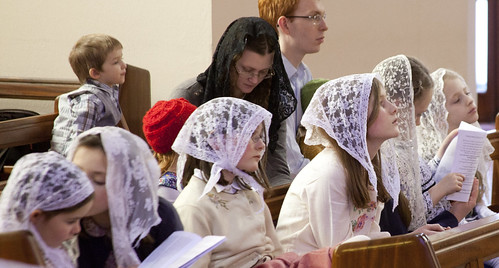 |
| At the St Catherine's Trust Family Retreat |
As time goes on, this sporadic attention to the grown-up material becomes more frequent, as successive linguistic and conceptual barriers to engagement are overcome. Children grow up. It is important to recognise that the period of sporadic engagement with adult conversation, with art, or whatever it might be, is normal, not necessarily boring for the child (who needn't be prevented from allowing his mind to wander), and part of the process of development. The way some educationalists talk, we might imagine that children should be quarantined from the adult world until systematic classroom teaching has equipped them to take part in it as an equal. That is the last thing, of course, which classroom education is capable of equipping a child to do.
The third category of experience works in a slightly different way: relationships. Children don't learn about love and friendship, anger, resentment, forgiveness, rivalry and cooperation, by taking notes from a blackboard. These are things which are not necessarily articulated at any point in one's life; a fully functioning adult, with sensitivity and good social skills, cannot put his wisdom fully into words, because that would be impossible, and greater 'emotional intelligence' doesn't necessarily imply a greater than average ability to articulate it. This is an understanding which is learnt from experience and example, experiences and examples which do not (primarily) convey propositions, but enter into a child, and effect his character. You can see children, and adults too, becoming more sensitive and more generous, or harder, more pinched and selfish, as time goes on. You can see it in their behaviour, and in their faces. It's not, primarily, a matter of their accumulating knowledge, it is matter of character formation.
Again, my point is that this is normal, and that this is an immensely important aspect of education--for want of a better word--which has nothing to do with formal education.
What I want to suggest is that while the liturgy is not normally like the first kind of experience, it is a bit like the second--engagement with things 'over their heads'--and a bit like the third--a child's education in relationships--and indeed these two kinds of experience are not completely different from each other. A child's liturgical experience is at once a matter of sporadic attention to what is grown up, but also something which has an emotional and spiritual impact on the child's developing character. The little things which a small child may happen to notice in Mass--a bit of chant, a beautiful vestment, the Infant Jesus in the crib--may not only be the subject of intense interest, but in small ways formative influences. As a child's attention to the liturgy becomes less sporadic, he will find that what he is now paying closer attention to is something with which he is already thoroughly familiar, as is the case with adult conversation or the pictures on the walls of his own home. This familiarity is a school of prayer, just as the emotional life of the family is a school of relationships.
The children of Catholics attached to the Traditional Mass are not preternaturally disinclined to run (or crawl) up and down, bang toys on pews, and pull each other's hair. They don't pay attention to everything the priest says and does from the moment of their baptism. They gain a useful training in being quiet and respectful, of course, by attending Mass with their parents. But the fundamental thing is that they gain a familiarity with the most beautiful and profound spiritual things, in a context of reverence of course, and not only does this lend itself to a growing understanding, in every sense, of what is going on, but it affects the development of their personalities. Liturgical hierarchy, order, and worship; the reality of holy things, and how they can be handled; the ordering of joy and grief and penance and praise into the prayer of Christ in the Church: these things can't be taught from a book, and they can't be picked up in a few weeks. They must gradually take form inside a receptive soul exposed to the liturgy over years and decades.
Like almost every Catholic of my generation, I was deprived of our great liturgical patrimony as a child. Even so, my early experiences of the liturgy had an effect on me, and not all bad. As well as some ghastly things, I have deep and moving memories of Midnight Masses, early morning Masses, monastic Vespers, the singing of the Ave Regina Caelorum: these stray things stayed with me and nourished my imagination and soul. What a privilege it is, now, to be able to take my own children to Mass. Without deprecating liturgical catechesis, discussing the readings and all that, the main message must be: Just let them soak it up.
And for heaven's sake don't take them away from grown-up worship in order to give them something 'easier to understand'.
Support the work of the LMS by becoming an 'Anniversary Supporter'.
Fundraiser for the Alliance of Pro-Life Students
 In the current climate, student pro-life societies are under great pressure and need support more than ever. One group doing this is the Alliance of Pro-Life Students, to which Oxford Students for Life is affiliated.
In the current climate, student pro-life societies are under great pressure and need support more than ever. One group doing this is the Alliance of Pro-Life Students, to which Oxford Students for Life is affiliated.Support the work of the LMS by becoming an 'Anniversary Supporter'.
Requiems in November: London and Oxford
On Saturday, 5th November 2016, the Latin Mass Society will have its Annual Requiem Mass in Westminster Cathedral at 2.00pm. This will be celebrated by Bishop Mark Jabalé O.S.B., Emeritus Bishop of Menevia. The MC will be Canon Poucin de Wouilt ICKSP.
-----------------------------------------------------
A work of pietas undertaken by current and former members of St Benet's Hall, to offer Mass for the repose of former members and benefactors of the institution, facilitated by the Latin Mass Society.
If a Catholic institution of any kind does not have an annual requiem for this intention, then it should do.
The celebrant was Fr Edward van der Burgh of the London Oratory, a former JCR President.
We had a simple catafalque for the 'absolutions', a beautiful ceremony after Mass in which the celebrant blesses the absent bodies, represented by the catafalque, with holy water and incense.
Mass was sung, and accompanied by the Schola Abelis, a chant schola composed of students and senior members of Oxford University, and 'townies' too.
Support the work of the LMS by becoming an 'Anniversary Supporter'.
What happened to hats? Christian Dior speaks
 |
| Bishop Cunningham was too polite to notice, but others did. |
Reposted from March 2015.
------------------------------------------
A short time ago I published a position paper on head coverings in church. In the Church's tradition, going back to the Apostles, men uncover their heads, and women cover them, during the liturgy. Men removing their hats is still demanded throughout the Church in practice: deviation from the custom is noted with a degree of shock. The custom of women covering them is widely, if not universally, observed in the context of the Traditional Mass, as well as being maintained in the Eastern Churches, but is seen in the Ordinary Form only when grand weddings demand hats for the ladies.
A complicating cultural factor is the disappearance, to an overwhelming extent, of headcoverings for both sexes in everyday life in Western fashion. This means that the liturgical custom looks like more of a big deal for women (who have to do something unusual: cover their heads), and less of a big deal for men (who just remain bare-headed), when for most of the history of the Church it was the other way round. Women simply kept on the headscarves, bonnets, veils, or hats, of their era, but men had to dandle their caps and hats in their hands or find a place to put them down or hang them up, no matter how cold the church was. This is why the Position Paper insisted on looking at the custom from the point of view of both sexes, and not just address the question: Why do (some) women cover their heads at the Traditional Mass?
 |
| Dior's 'New Look', with hat. |
It raises the question: what on earth happened to hats? Photos of crowds out of doors from between the wars, and earlier, show practically everyone was wearing a hat of some kind. People didn't leave home without one. Things changed in the 1950s, much to the regret of the couturier Christian Dior, who explains that he never put an outfit onto the catwalk without one.
It may seem odd that we should go to all this trouble over a hat when women are in fact wearing them less and less. In my opinion, this regrettable departure is due to a reaction against those miserable pieces of headgear, in straw, bedizened with plumes and flowers, with which women disguised the poverty of their wardrobe during the war. Personally I consider that a woman without a hat is not completely dressed. The fact that very young girls can get away with being hatless has encouraged their mothers to imitate them. But they are simply depriving themselves of an agreeable addition to their appearance and are apparently not sufficiently aware that the cry:
'How pretty you look today!' often means no more than:
'How well your hat suits you!'
Dior by Dior: the Autobiography of Christian Dior, first pub 1957, p81 of the English edition.
Dior's views are interesting, but I am sceptical of his explanation of the demise of the lady's hat. More influential, I should think, would have been the fact that, as he regarded it as necessary for every outfit to have its own hat, the cost and inconvenience of ladies having to buy and store vast numbers of hats, each to be worn only a handful of times, told against it. As for men, a shop assistant at a famous London hatter once told me that it was small cars that did for hats. This is certainly a problem. Walking and public transport are much more friendly to hats, and the explosion of car ownership in the 1960s must take some blame for their demise. There's a lot to be said for the kind of hat which can be put in a pocket, such as caps and deerstalkers.
 |
| Dior encounters conservative opposition in the USA. |
However, these sorts of factors don't go to the heart of the problem, which Dior brushes against when he notes that, as even he can see, 'very young women' can get away without hats. With men, it is again older men, with thinning hair, who benefit from them most, and when they were widely worn they made callow youths look more grown up. A big part of the explanation is that in the 1950s we are beginning to encounter the cult of youth. This was aided by the prosperity of the era, which put money in the pockets of young people as never before, something with increasing economic significance as baby-boomers came of age.
The cult of youth is also about a new focus on sexual attraction, particularly on attractive young women. This is manifested, obviously, in revealing clothes. In this context it is not hard to see that the replacement of hats with artfully coiffed hair not only plays to the lustrous manes of the young, but can be alluring in just the right way.
But as Dior noted, ladies look good in (good) hats. His own most notable achievement as a designer was the 'New Look', which made skirts longer, while emphasising a lady's waist. It was fun and attractive without being immodest. (The funniest passage in his book is his description of being picketed by American women angry at his promotion of a fashion which hid their legs.) The saddest thing about modern fashions is that while they are good at advertising the wearer's sexual availability, they don't make people look nice. Those with stunning natural looks can survive in this environment; the rest of us are left to flounder.
Right now, looking out of the window at the snow, I think people who walk around without hats are mad. Like the cricketer Chris Lewis, who got sunstroke after shaving his head and then refusing to wear a hat on tour in Antigua, I suppose they are suffering for the sake of fashion.
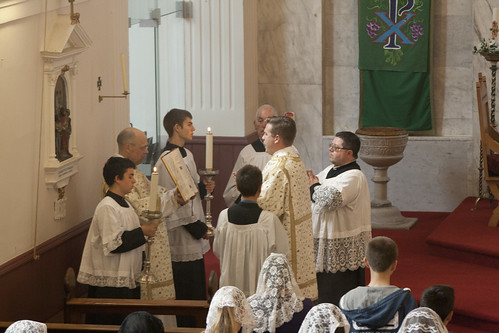 |
| Mantillas on display the St Catherine's Trust Summer School, a Mass at Holywell |
Support the work of the LMS by becoming an 'Anniversary Supporter'.
Richard Swinburne, homosexuality and the Society of Christian Philosophers
Support the work of the LMS by becoming an 'Anniversary Supporter'.
'You can't fight it'
 |
| An act of evangelisation: the LMS Pilgrimage to Walsingham |
I have to confess that developments over the last few years in the Church and the world have left me a little dispirited. Not all the news has been bad--far from it--but on a series of issues fundamental to the continued possibility of civilised life, the forces ranged against sanity have, at present, considerable momentum. Not only is it difficult to see how they can be defeated on the current balance of forces, but the balance of forces is becoming progressively less favourable as time goes on.
To give an example from secular politics, here in the UK we have no serious political party which supports anything recognisable as social conservatism. To give an example from the Church, although numbers attending Mass have been bolstered by immigration, the decline in marriages celebrated in church continues. On previous occasions when, after all kinds of difficulties, the Church has experienced a great revival, it has been because Catholic families survived the crisis in sufficient numbers to provide the priests, lay leaders, reformers, and above all the foot-soldiers of a revived Church in the new situation. How many faithful Catholic families are there going to be, in England and Wales or indeed anywhere in the West, in 20 or 30 years' time?
Come to that, how many are there now? How many nominal Catholics have any serious formation in the Faith, as would have been taken for granted sixty years ago? How many believe the less popular doctrines? How many seriously aspire to a morally well-ordered lifestyle? And how many are free from intense pressure to conform to the false maxims of the World?
The work we can do in the Vineyard of the Lord is, for each of us, of negligible overall effect, in relation to the huge trends which I been noting. I rather think this is even true for Bishops, perhaps even for the Pope. A good Pope with good ideas applied with vigour would, of course, do good, but he won't necessarily change the course of history. I think of Pope Leo XIII, for example, or Pius IX, or St Pius X. These weren't just good Popes, they were men of great intelligence and education, acutely attuned to the problems of their day, who furthermore wielded considerable power with great energy, for a long term of office. One can hardly say that they lived in vain, but nor did they turn the tide. It is given to few human beings to do such a thing.
A great many Catholics, or nominal Catholics, have taken the obvious conclusion: you can't fight it. The particular thing right now they are declining to fight is gender ideology, despite the repeated and powerful protests of Pope Francis on this issue--protests many of his self-described supporters would rather not hear. But they have been failing to fight the secularisation of Catholic education, the culture of death, liturgical anarchy of all kinds, and a host of other things, for a long time now. It is tiring to keep up the fight. And if you show a bit of enthusiasm for the other side of the argument, the world will often reward you well.
To avoid despair, I want to make two distinctions. The first is between our duty as Catholics and worldly success. Our duty as Catholics is to live in accordance with God's (and the Church's) law, and give witness to the Gospel according to our abilities and opportunities. It is not to convert X number of heathens, or be part of an expanding parish, or even to knock on a certain number of doors like the Jehovah's Witnesses. It can be very hard work doing what we are obliged to do, and it is made harder by all kinds of trends and developments, but it is not something which will ever become impossible. The task we have been given to do--to cooperate in our own salvation--is not only not impossible, but we are actually guaranteed the necessary graces, and told that this burden is light, this yoke easy, in the sense that with that grace we will be able to do it without regrets, with joy, knowing that life in God's friendship is preferable to life without God's friendship, regardless of the possible worldly disadvantages of the former over the latter. We aim make a success of our particular projects, but that success, at least by any tangible measure, is not necessary to the success of our lives as Catholics.
The other distinction is between trends in the world and developments in the Church. It is possible that the governments of the world will adopt the most pernicious principles and remain wedded to them for centuries to come. That is not possible in the Church. Catholics and their allies can be comprehensively defeated in the political arena--and this has indeed often happened--but it is not possible that Christ will allow his bride to be taken from him.
Throughout history there have been those who have wanted to efface the teaching of the Church and replace it with falsehood, and right now we are facing a particularly powerful and concerted effort to do this. It will not succeed. In past crises there have been mass defections to heresy by members of the clergy, by bishops, and by whole national populations of the laity (as happened with Protestantism), but when the dust settles the Church, and her teachings, remains. Even if the Pope falls silent, even if he allows himself to pronounce ambiguous formulations or indeed outright error (I'm thinking, of course, of Pope Honorius and Pope John XXII), the teaching of the Church does not change, the Church remains, and the visible, human aspect of the Church recovers from the crisis.
So in these two senses, it is not at all true that 'you can't fight it': as far as our own lives are concerned, our own living according to the truth, and insofar as the fate of the Church as an institution is concerned, the opposite is true. For ourselves, the battle can go either way: there is everything to fight for. For the Church, victory for the truth is actually guaranteed.
Indeed, the frustration of the opponents of the Church's teaching not infrequently breaks through the facade of optimism. They think the Church must be conformed to the world, and it just won't. They can't control all of the people, not even all of the bishops and cardinals, and they can't erase the historical record of the Church's teaching, and if the people were silent the stones themselves would proclaim the kingship of Christ.
In the meantime of course they do great harm to souls, and it is our obligation to oppose them with every lawful means available. If they want to win, though, they need to give up on the Church and join a political party.
I've recently read two helpful articles on related matters, which I recommend. Pat Archbold on 'The Most Radical of Traditionalists', and Fr David Nix on 'The Birth Pangs of the Church'.
Support the work of the LMS by becoming an 'Anniversary Supporter'.



